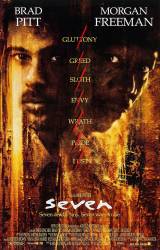
Other mistake: When Somerset goes back to the man's house alone, he cuts a sticker on the door with his switch-blade to get in. The first error is the sticker is on the inside and it says "Keep Out." The best part about it is the door opens inward. How did they put the sticker on the inside and then exit? (00:20:45)






Answer: I've seen se7en hundreds of times, and I've always wondered what Mills was trying to say to Somerset, and here's my take. If you've noticed, the recurring theme between the two was their conflicting views on how they see the world around them. Somerset is the grizzled, experienced detective who has been through the ringer, so he's views are more pessimistic in nature. Which I can sympathize with. Mills being the rookie detective that he is, was the optimistic, "I'll be the hero" kind of guy. So much so that Somerset called him out for being too Naive, and that he can't be like that. So getting back to the question at hand. During the chest shaving scene, I believe Mills was about to tell Somerset that his dark pessimistic view of the world around them makes sense. Mills wanted to say that Somerset was right, which he wasn't able to bring himself to do.